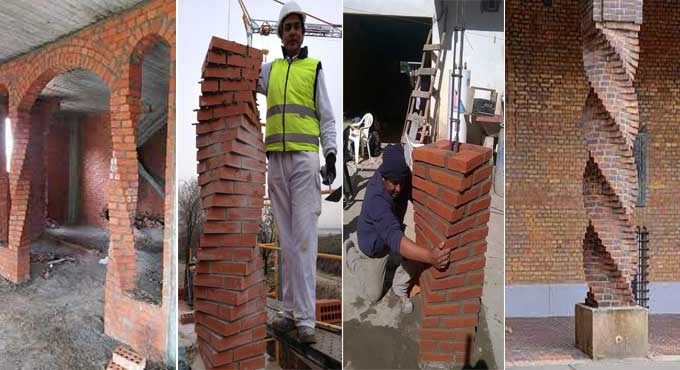NEWS | SOFTWARE | SHEET
How to Build a Beautiful Twisted Brick Column
When each course is plumbed and leveled as you go, brick columns typically take a long time to construct. It is much easier to notice a bit of a deviation when you set up jack lines, but you still need to plumb and level. As far as laying out twisted brick columns is concerned, it is a little more challenging, but once you begin laying, it is much more enjoyable.
The timeless, classic aesthetic of brick columns can be added to any property. Building your own brick column can be a fairly straightforward process if you have some masonry experience, whether you need one for decorative purposes or for structural support.
In general, the basic idea remains the same regardless of the structural requirements and dimensions of the column you choose.
Twisted Brick Column Construction Process
It is your idea to build a nice pool house on a twisted brick pier. There will be two more courses of construction after the top of the pier is squared off.
If the first and last courses are square with each other and with the structure, a column will appear proper. Taking a few measurements will allow you to calculate how to square the column once you have it squared. In order to determine the height of the span from a footing or slab to a soffit, first you must know its height. There is generally an 8 to 12 foot height range for spans.
How to Calculate Twisted Brick Column
A height of 8 feet translates into 36 courses, a height of 10 feet translates into 45 courses and a height of 12 feet translates into 54 courses.
You will see in a moment that at a distance of 8 feet 8 inches, there are 39 courses, making figuring out the degrees of each twist a bit tricky.
There are four possible twists on the column: 90 degrees, 180 degrees, 270 degrees, and 360 degrees. The full column in this example will have three twists from bottom to top, or 270 degrees.
The 54 courses will also need to be piled up at a height of 12 feet. In mathematics, 270 degrees divided by 54 courses equals to 5 degrees of twist per course.
You can mark the pier's center at 5 degrees using a speed square or protractor. It is pretty simple if you use a speed square: place its pivot in the middle of the pier's span.
You can turn the pier 5 degrees by rotating the speed square on the pivot and marking on the scale along the hypotenuse. It is extremely easy and you can determine the height, the number of courses, and how many twists you need, as well as build any twisted column you like.
Twisted Brick Column Limitation
The steel can be plumbed off the outside of the current course when building a larger twisted brick column where you are wrapping a structural column. There is no substitute for stepping back and reviewing your work, as this thick layer can spot out of plumb from a mile away.
Difference between Twisted Brick Layer & Twisted Brick Pier
The layout of a twisted brick column and a twisted brick pier differs, and a column is not the same as a pier.
When it comes to columns, they need to be square with their respective roofs or soffits, but a pier can be twisted as much or as little as one wants, with the top of the pier being forgiving even if it is twisted.
To get more details, watch the following video tutorial.
Lecturer: Building Construction
Twisted brick columns and twisted brick piers can be laid out in one way, and they differ from one another. There is no tolerance for twisted piers, but columns need to be square with the roof or soffit.


